Wendy Baker - 2012
Historical Society: Are you ready?
Wendy Baker: I'm ready.
H.S.: What started you into sports?
W.B.: I think from the time I was little, I was coordinated and I liked balls. That was what I was told. I like any kind of ball. I had an older brother who was six years older than me. I think that helped too. The rough-and-tumble, I had a lot of that. I think that is what did it, being born, having an older sibling and just liking balls at an early age. I was also very active. My parents said I was always climbing things, just a tomboy. There wasn't a whole lot of little girl inside of me.
H.S.: How did you develop your skills?
W.B.: Early on, it was playing with the neighborhood kids and a lot of them were older. They were my brother's friends. We used to have wiffle ball games. That was how it initially started - wiffle ball in my side yard. It was mostly older kids. I got my love of ball going. I can remember being seven or eight years old and my brother six years older and his friends picking me to be on their team before they picked my brother to be on their team. I also remember as I got a little bit older playing rundown. I don't know if you're familiar with that or not. It was where two people have gloves, there are two bases and there is somebody in the middle. They are caught in a rundown and you keep throwing the ball back and forth until you tag them. It was just the love of any game. I love competition and I love games.
H.S.: What did you get out of playing games?
W.B.: I'm not sure how to answer that. I loved it and I like to win so when I won, it was just that feeling of being a winner. That probably kept me going.
H. S.: I probably shouldn't ask you if you are competitive then, huh?
W. B.: {Laughter} I very much am - even to this day. My daughter's coach has told her several times stop listening to your mother in the stands. I have a hard time being very quiet. I'm very vocal, and it was the same with my dad. My mother jokes now she used to sit hundred feet away from my dad because my dad would embarrass her. She tried to keep them quiet. She couldn't do it. Now I am my father, I am.
H. S.: What was the first sport you actually played on an organized team?
W. B.: Minor League baseball.
H. S.: How old were you?
W. B.: Probably six or seven when I started playing. I even have a picture of when I was around eight with a bunch of boys because back in the day a lot of little girls didn't play. Softball, they didn't have any kind of organized softball.
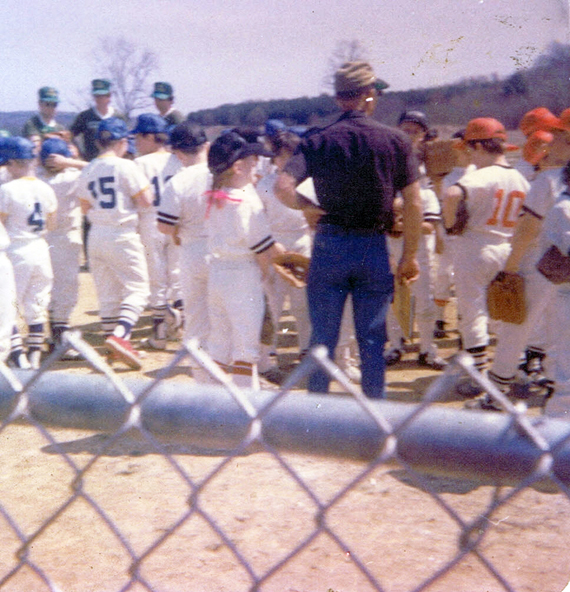
Minor League Baseball, Wendy with the pony tail.
W. B.: I can remember going to a slumber party with my baseball team because we had done well and I think I was around eight. The little boy who was throwing the slumber party, his parents called my parents and said they really wanted me to come. My parents were struggling a little bit with that. But I did, I went to a slumber party with all the boys. It was supervised and I was just one of the boys.

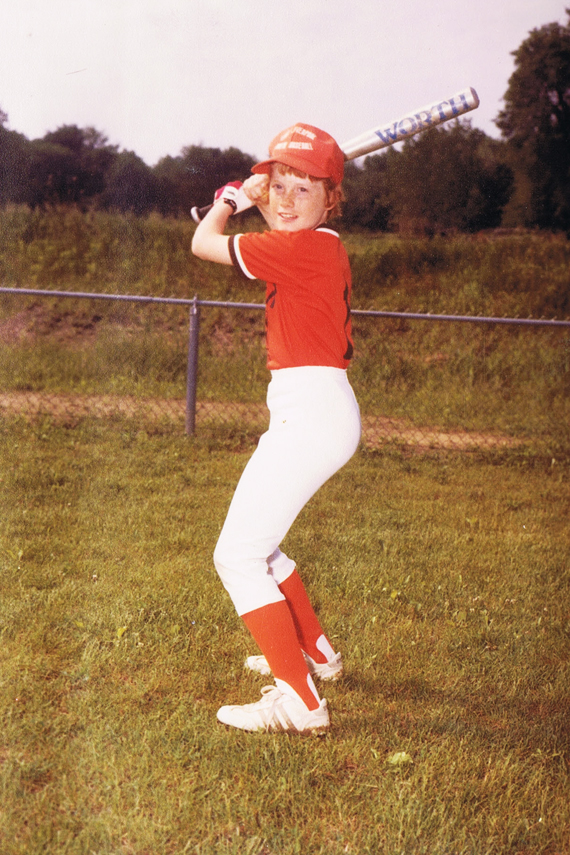
H. S.: Basketball and softball in high school?
W. B.: Yes, I played volleyball in middle school; it just wasn't my thing. I was good at it. I just didn't enjoy it.
H. S.: How did you learn to dribble?
W. B.: I believe people can be taught to dribble. It's just repetition, getting to the point where it's just practice, practice and more practice.
For me I also think some people were born coordinated, more coordinated than say someone else. For me the first basketball team I played on was in seventh grade. I have no memory prior to seventh grade of playing with a basketball. It was more baseball; there was no hoop around my house. I may have run into a basketball, I may have but I have no memories nor pictures or anything concerning a basketball prior to grade seven. I just knew I could do it. It came naturally to me, just being coordinated, from that point on. Once I decided I liked to play basketball and wanted to play it, a basketball never left my hand, you could say. I played it year around. My parents got me a loop hoop and it became an all year around game for me.
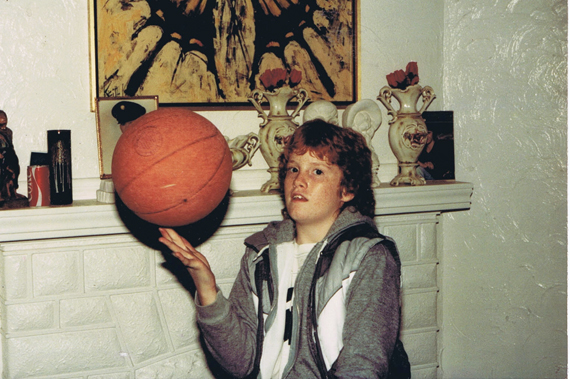
7th or 8th grade.
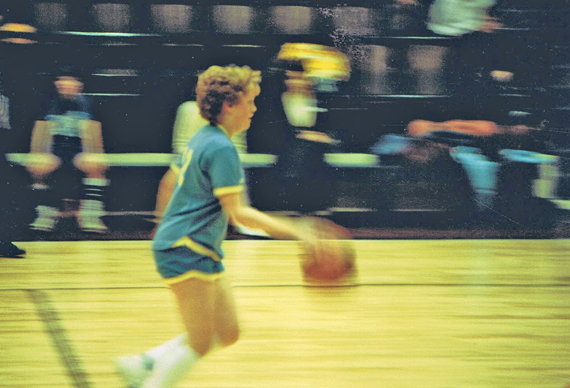
East Liverpool Christian School, 7th or 8th grade.
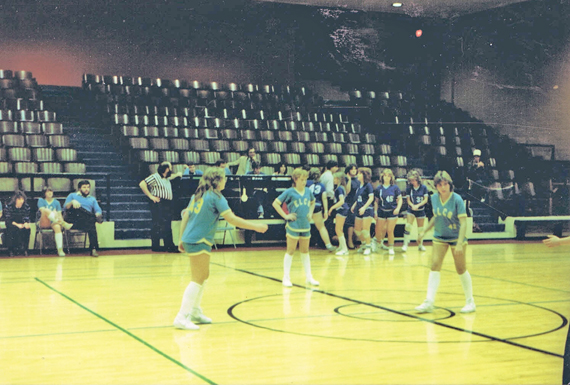
East Liverpool Christian School, 7th or 8th grade.
H. S.: Some have said there is a desire to play and there is a desire to win; they may not be the same thing. Do you agree with that?
W. B.: No. Let me explain that. Maybe I do to a certain extent. I think if you have the desire for sports, you want to be a winner not only just to play. That doesn't mean you're going to be or that you fall apart if you don't. I think they go hand-in-hand. If you have the desire to play, you also have the desire to win.
H.S.: I think previous answers to that was referring to just making the team and to play in the beginning.
W.B.: Oh, okay. In that respect, yes. Initially when I was young, I just wanted to play, play anything and everything. Winning was nice as far as it will be evolving a younger age yes, you just want to play at a younger age. I remember being in elementary school. All the little girls would be on the swings and the boys; I would be over with the boys playing whatever pickup game they were playing. I was with the boys. I just wanted to play, to be involved.
HIGH SCHOOL
BASKETBALL
1985-86 Varsity Basketball Team. Wendy Baker far right kneeling.
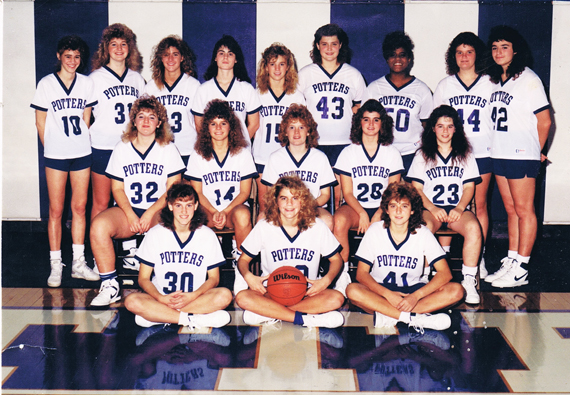
1988-89 Varsity Basketball Team. Wendy Baker third from left, second row.
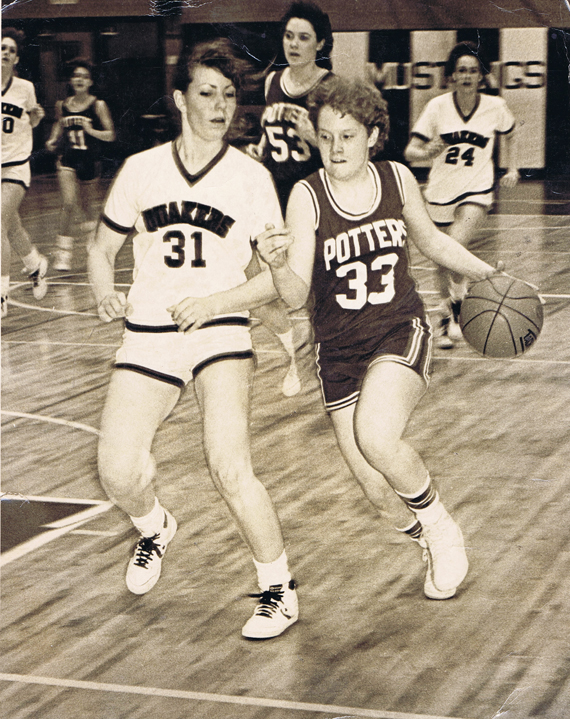
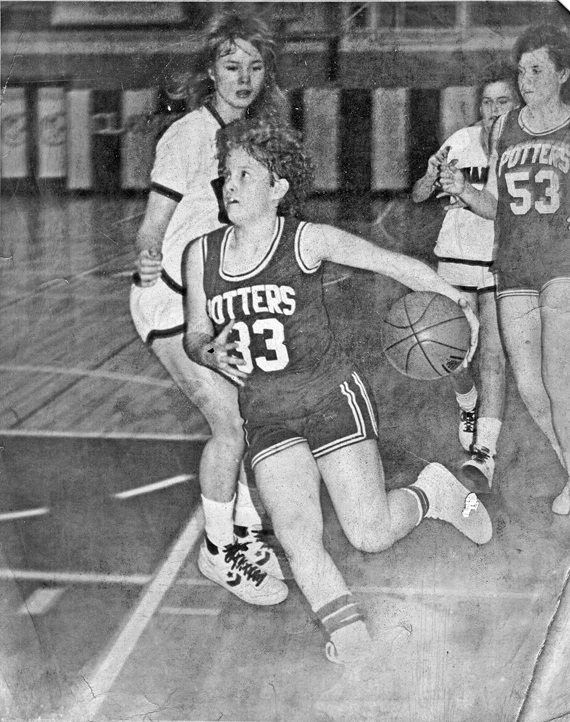
H. S.: You said broke the record and set a new record for most points in basketball.
W. B.: Yes, I did, or at least that is what I've been told.

Here of late, I have looked at the site (East Liverpool Historical Society Web site) and yeah, I don't know what to do with that. When I hit 1000 points and I don't know if the article is in there (the box of newspaper clippings), I was quoted as being the first person, male or female, to surpass the thousand point mark. Here of late I am seeing things, I can't remember his name, saying there was someone before me. I definitely was the first female.
H. S.: You're talking about Ken Cunningham, class of 1961. He was the first to get 1000 points. You did hold the record for most points total. You had more points than Ken Cunningham had, but he was the first to get 1000. You are the first and only Lady Potter to get over 1000 points.
ELHS Basketball Exclusive 1000 point Club
W. B.: The Review originally printed that I was the first. Steve Flores was the one who passed my record. I knew he was getting ready to break it, so I went to the game. I had balloons ready. The Review took pictures.
I didn't play varsity ball right away my freshman year. I played JV ball. I don't remember how soon, I eventually got to where I was playing some varsity ball and then half-and-half and by the end of my freshman year I was playing varsity ball full time.
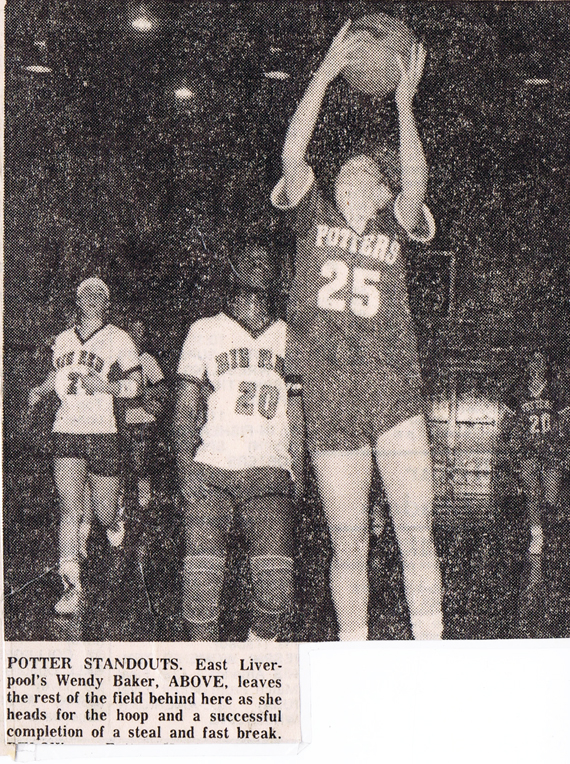
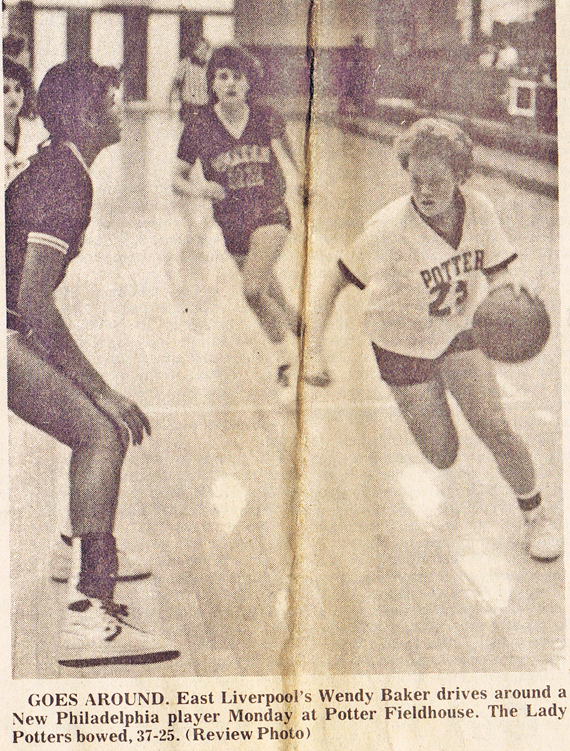
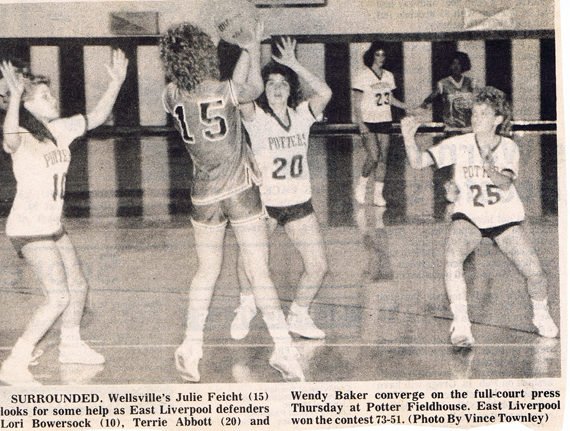
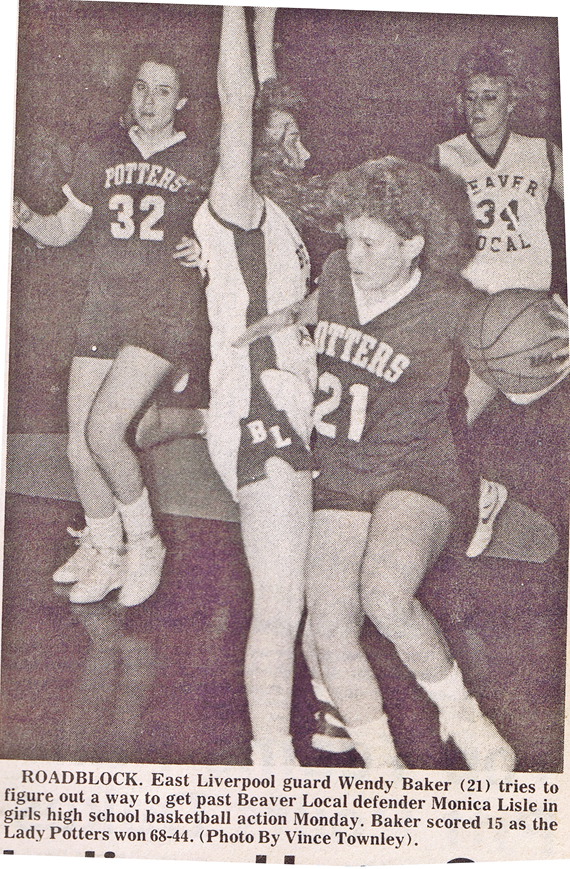
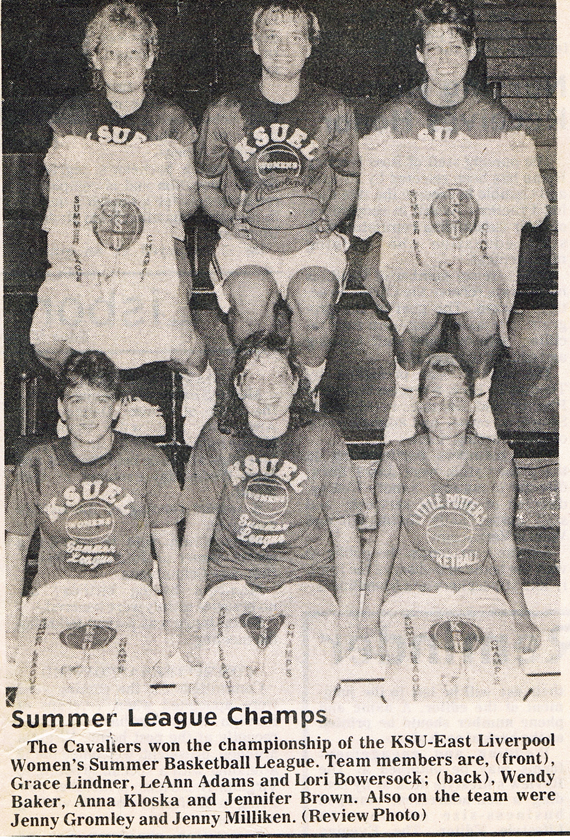
The KSU-ELO summer league would've been during my high school years. I believe I took part in that the summer after my sophomore and junior year. So the summers of 1987 and 1988. It was held in the KSU building downtown. I do believe that was back when KSU-EL still had a girls basketball program, because I can remember there were college girls playing also. I also remember the college girls not liking the high school'er showing them up. :o) haha
SOFTBALL
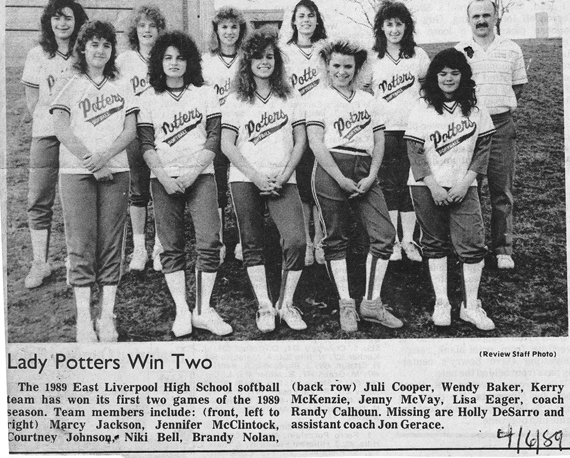
1989 Softball Team
H. S.: I've heard that you knew how to throw strikes. A little birdie told me that.
W. B.: Some little birdie! {Laughter} Yes, yes I did. Everything is in those papers. [Wendy brought a box full of newspapers clipping, pictures, etc.] If there is a record for strikeouts, I am sure I have it. I think there were games that we played which were, I think, 9 innings, but I know there are a few in there, 27 strikeouts. I think I did see one time, which is a perfect game I believe.
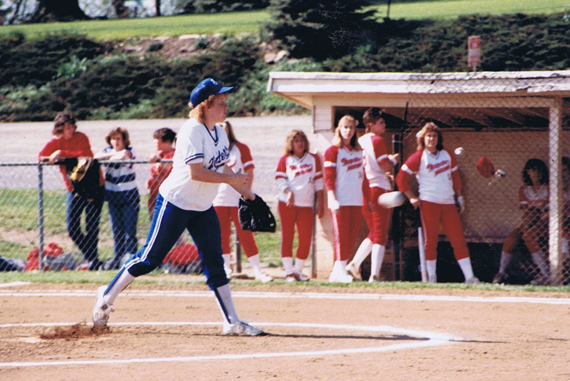
I remember my freshman year starting. Tawny Broadbent was the pitcher.
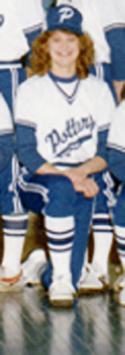
Tawny Broadbent from a 1984 Varsity Softball Team Picture.
I played third base. I started at third base. Watching her in there again, just my love of winning and wanting to make things happen, I wanted to be a pitcher. By the end of my freshman year, I was getting a little bit of time pitching so that when my sophomore year rolled around I had the duties the next three years. Tawny was a good pitcher. She was, and she inspired me to learn how to do that. I know that during the course of my learning how and finally getting to the point where I was really good at it, my parents both were my biggest fans, but my dad took an instrumental role.
I can remember, when we lived on Ninth St., beside our house, we had a long sidewalk. My dad would sit on a bucket, and I would stand all the way down at the end of the sidewalk, it was actually uphill a little bit. I injured him many times. The ball hit off his kneecap, as I would pitch to him. "Still a strike." That is what he would say, "It's still a strike," and fall over in pain but it's a strike.
I had a high school catcher: Lisa Eager was her name. She had pins in her thumb I believe it was. She was no longer my catcher after that. She had her hands and the ball broke her thumb. She had to have surgery and had pins put in it.
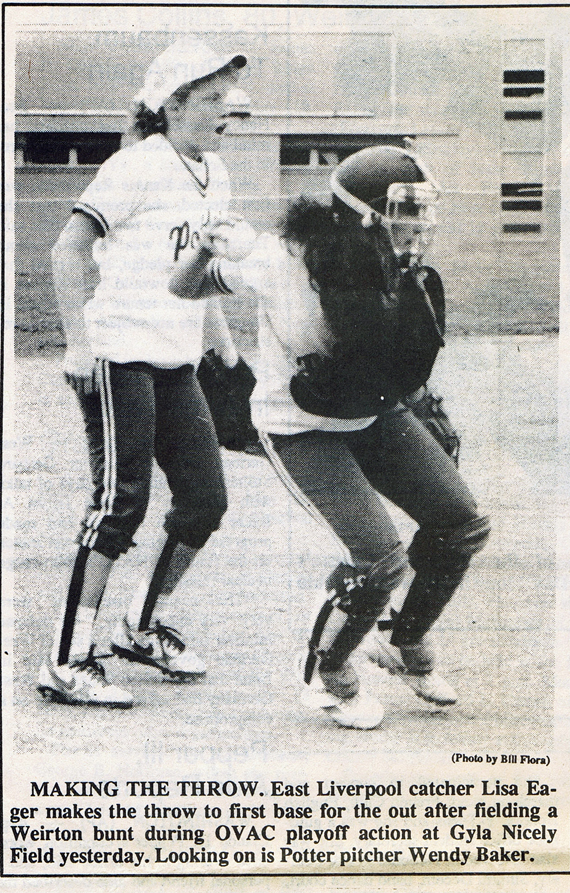
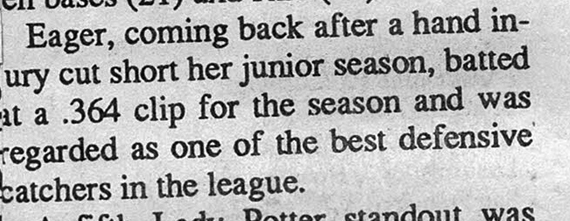
The Evening Review, Wednesday, June 14, 1989.
From a follow up email Wendy said " Brandy Nolan took over as my catcher when Lisa was injured."
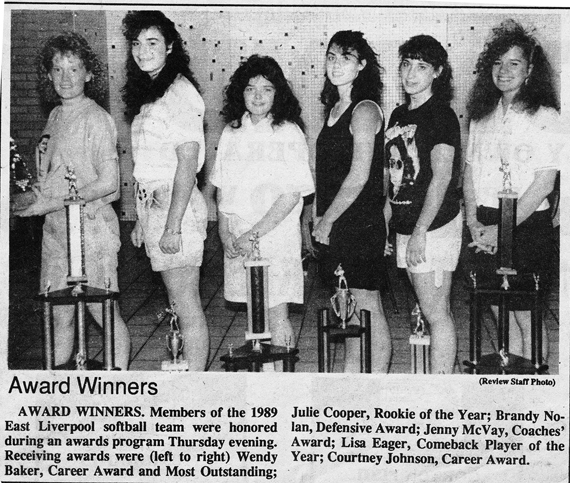
CONTINUE TO:Wendy Baker: Determined not going to be denied 2
This site is the property of the East Liverpool Historical Society.
Regular linking, i.e. providing the URL of the East Liverpool Historical Society web site for viewers to click on and be taken to the East Liverpool Historical Society entry portal or to any specific article on the website is legally permitted.
Hyperlinking, or as it is also called framing, without permission is not permitted.
Legally speaking framing is still in a murky area of the law
though there have been court cases in which framing has been seen as violation of copyright law. Many cases that were taken to court ended up settling out-of-court with the one doing the framing agreeing to cease framing and to just use a regular link to the other site.
The East Liverpool Historical Society pays fees to keep their site online. A person framing the Society site is effectively presenting the entire East Liverpool Historical Society web site as his own site and doing it at no cost to himself, i.e. stealing the site.
The East Liverpool Historical Society reserves the right to charge such an individual a fee for the use of the Society’s material.